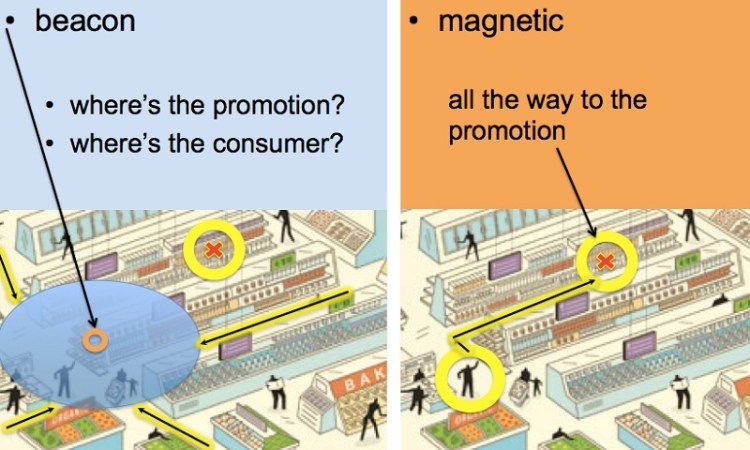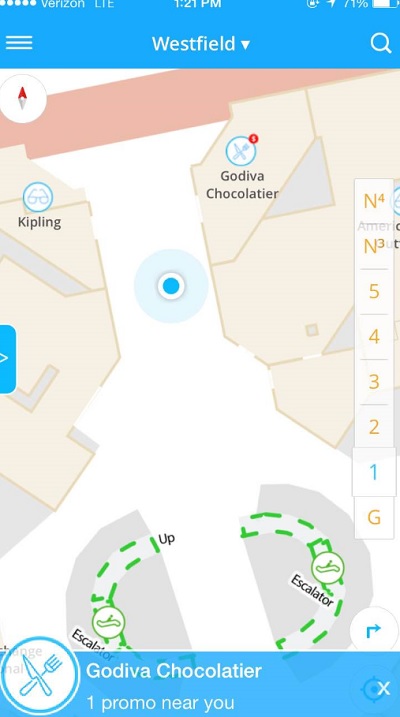IndoorAtlas, which helps you navigate inside enclosed buildings such as shopping malls, has teamed up with Yahoo Japan to deliver indoor positioning services across Japan.
Palo Alto, California-based IndoorAtlas has been conducting beta tests in places such as San Francisco for its “indoor positioning system,” or IPS, which lets you navigate to find specific stores, brands, products, promotions, and even people. The navigation is a big deal because retailers say they lose 15 percent of sales because consumers cannot find the store or the product they’re looking for.
IndoorAtlas said it was chosen because of its scalability, accuracy, ease of deployment, and the developer program that lets others build apps on top of its location service.
The partnership will lay the foundation for enriching Japan’s smartphone maps. And it will boost usage of IndoorAtlas, as Yahoo Japan generates 63 billion page views per month.
IndoorAtlas could reach as many as 38 million people in the greater Tokyo area alone.
“We are thrilled to be selected by Yahoo Japan for this major deployment of our indoor positioning platform in such an important market for us,” said Janne Haverinen, CEO of IndoorAtlas, in a statement. “The agreement extends IndoorAtlas’ global leadership in indoor positioning and reflects the demand we are seeing for location-based services.”
“With IndoorAtlas, we were excited to discover an infrastructure-free solution that does not rely heavily on beacons,” said Gen Miyazawa, president of Media Company at Yahoo Japan, in a statement. “By leveraging IndoorAtlas’ platform, we can build a range of location-based services with ease and its cloud-based platform will enable us to scale cost effectively unlike other technologies available on the market today.”
IndoorAtlas said its positioning is accurate to within one or two meters. That seems right to me, as I tested it last year in the Westfield San Francisco Centre, a multistory shopping mall.
Using the standalone IPS app, shoppers will be able to find the exact locations of specific products at multiple locations and then be guided to the last meter to find them. When I tried it, I searched on items such as men’s watches and was directed to different stores that offered them in the mall. We also found a restroom, which is the most frequently requested location at a mall. The directions were accurate, showing me a path around various obstacles among the Bloomingdale’s displays.
The service works only indoors and is a complement to global positioning systems. GPS uses a network of satellites for fixing locations. By contrast, IndoorAtlas built a system based on the way that sea creatures such as lobsters and turtles navigate the oceans.
“We believe the IPS app will change the way people get around indoors, just like GPS did for outdoors,” said Haverinen. “Our patented technology accurately determines positions within a wide range of indoor use cases like shopping malls, airports, museums, hospitals, hotels and more. … that leverage proximity awareness to deliver a superior experience to the visitor.”
IPS uses the core IndoorAtlas magnetic positioning technology and a smartphone compass to detect anomalies in the Earth’s magnetic fields. The company said the magnetic positioning works in every building with steel girders, to an accuracy of one to two meters. That makes it possible to do accurate indoor navigation, location-aware mobile search, location-based advertising, and online-to-offline commerce. This magnetic solution eliminates the need for cumbersome, expensive, hard-to-maintain external infrastructures such as beacons, routers, or radio access points via Wi-Fi or Bluetooth.
The app can’t yet identify which floor you are on in a multistory building, however. You have to tell it which floor you are on.
Founded in 2012, IndoorAtlas already serves about 270 million users globally, thanks to a commercial rollout it did with Baidu in China. The company has 20 patents and more than 40 employees. It also signed a partnership with SK Planet in Seoul last week to enhance the O2O service, Syrup.
IndoorAtlas spun out of Oulu University in Finland. It has raised $14.5 million to date, including $10 million from Baidu. The IPS app is available on Android and iOS in a private beta in the U.S.
VentureBeat's mission is to be a digital town square for technical decision-makers to gain knowledge about transformative enterprise technology and transact. Learn More



